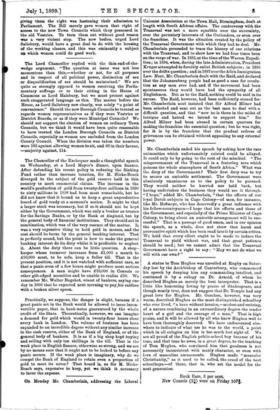The Chancellor of the Exchequer made a thoughtful speech on
Wednesday, at a Lord Mayor's dinner, upon finance. After defending his recent policy in reducing the Sinking Fund rather than increase taxation, Sir M. Hicks-Beach diverged to the subject of the gold reserve held in this country to meet commercial claims. The increase in the world's production of gold from twenty-four millions in 1890 to sixty millions in 1898 had been most remarkable, but he did not know that it bound us to keep a great unproductive hoard of gold ready at a moment's notice. It might be that a larger stock was necessary, but if so it should not be kept either by the Government, which was only a banker as trustee for the Savings Banks, or by the Bank of England, but by the general body of financial institutions. They should act in combination, which was of the very essence of the matter. It was a very expensive thing to hold gold in masses, and the cost should be borne by the general banking interest. That is perfectly sound, but the point is how to make the general banking interest do its duty whilst it is profitable to neglect it. About the duty there can be little question. A shop - keeper whose turnover increases from 21,000 a month to 250,000 must, to be safe, keep a fuller till. That is the present position, and it is not watched with sufficient care, so that a panic even of a few hours might produce most serious consequences. A man might have 210,000 in Consols or other gilt-edged securities and be unable to realise 210. We remember Mr. Walter Bagehot, wisest of bankers, saying one day in 1866 that he expected next morning to pay..his cabfare with a broken silver spoon.















































 Previous page
Previous page